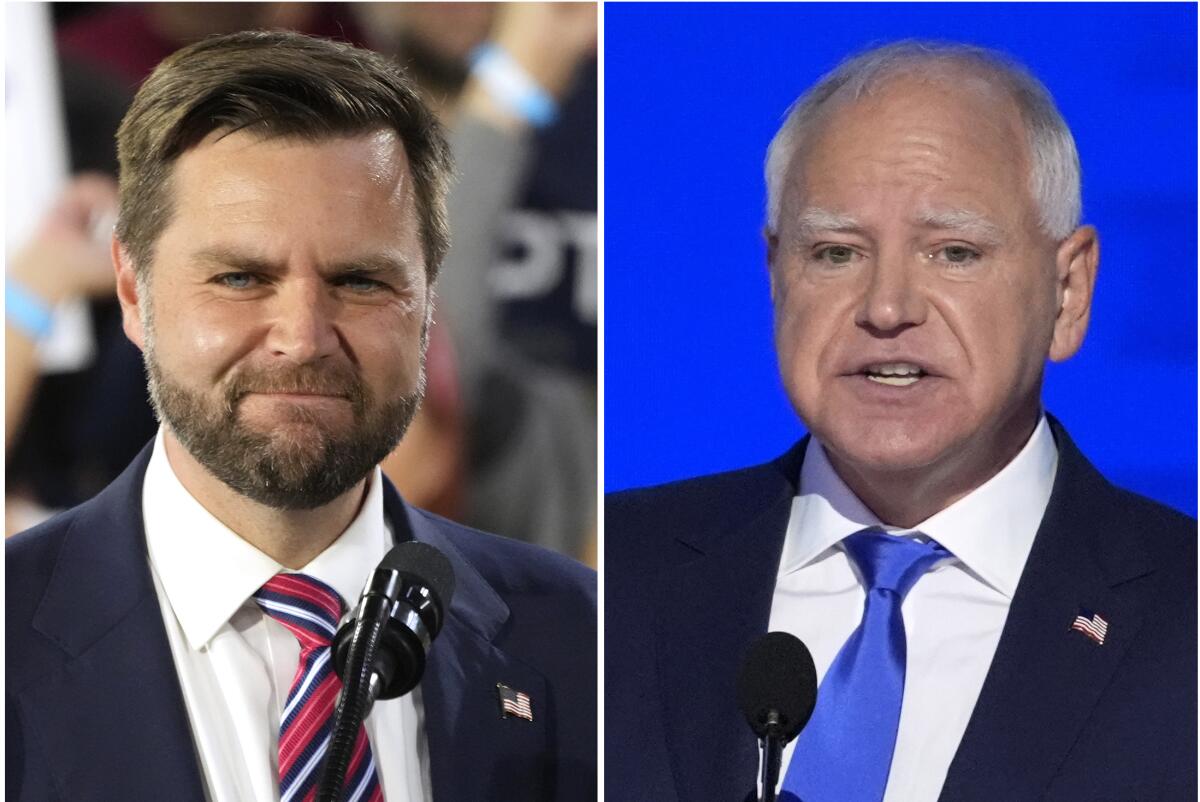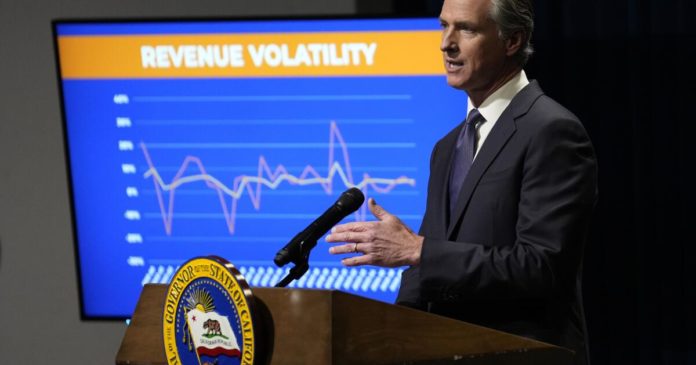Good morning. Here’s what you need to know to start your day.
Newsletter
Sign up for Essential California
The most important California stories and recommendations in your inbox every morning.
You may occasionally receive promotional content from the Los Angeles Times.
What Newsom bill signings and vetoes tell us
Gov. Gavin Newsom’s desk is now empty after he decided the fate of hundreds of bills approved by state lawmakers this legislative session.
On issues including the environment, healthcare and artificial intelligence, the laws our governor decides to approve and reject say a lot about his priorities for California.
One predominant theme this year, explained Laurel Rosenhall, California politics editor and Sacramento bureau chief for The Times: “the state is low on money.”
The state’s massive budget deficit meant lawmakers were limited in their approach to policy bills, “so a lot of the things that got passed were things that wouldn’t cost very much,” she noted.

Gov. Gavin Newsom has approved five anti-crime measures this month, including two Saturday.
(Rich Pedroncelli / Associated Press)
Laurel pointed to another factor this year: The inescapable national election between Vice President (and longtime Californian) Kamala Harris and former President Donald Trump.
“There could be political reasons to veto some bills that would bring a lot of attention to California in a year when he’s really wanting to help the Democrat win for president,” Laurel said.
Here are a few of the most consequential approvals and vetoes Newsom made to cap this legislative year — and what they tell us about state and national politics as 2024 winds down.
Wrangling the burgeoning AI industry remains controversial
The benefits and hazards of AI remain a hot topic across the world — and California’s Silicon Valley drives much of the lucrative tech at the center of those hopes and fears.
Although Newsom approved bills related to limiting AI’s use in Hollywood and political deepfake ads, he vetoed the most controversial bill.
SB 1047, authored by Sen. Scott Wiener (D-San Francisco), sought to require AI companies to develop guardrails to prevent the technology from being used to conduct cyberattacks and other “critical harm.”
Although the bill garnered support from AI researchers, Elon Musk and economic equity advocates, it was opposed by Meta, ChatGPT maker OpenAI and several Democratic lawmakers, including Rep. Nancy Pelosi (D-San Francisco).
Newsom vetoed the bill Sunday, saying it could give the public a “false sense of security about controlling this fast-moving technology.”
“… The bill applies stringent standards to even the most basic functions — so long as a large system deploys it,” he wrote in his veto message. “I do not believe this is the best approach to protecting the public from real threats posed by the technology.”
His decision wasn’t all that surprising, Laurel said, given Newson’s “very deep ties to Silicon Valley.”

California Gov. Gavin Newsom, left, and Marc Benioff, chief executive of Salesforce, meet during the Dreamforce conference in San Francisco on Sept. 17, 2024.
(Bloomberg / Getty Images)
“He very much embraces California’s role as this cradle of innovation,” she said.
And as Times reporters Taryn Luna and Wendy Lee noted this week, Newsom continues to tread lightly with Big Tech so as not to stifle that innovation. But the sustained debate on the topic makes it clear that the AI dilemma is not going anywhere.
Newsom rejected some immigration-related bills his progressive base typically supports
The governor vetoed two bills that aimed to expand services for undocumented immigrants in the state, including one that would have allowed them to participate in a subsidized home loan program.
In his veto message for AB 1840, Newsom pointed to “the finite funding available” for the program and said expanding eligibility “must be carefully considered within the broader context of the annual state budget.”
The other, AB 2586, would have allowed college students who are undocumented to be employed by the universities. Newsom rejected it, citing concerns for “potential criminal and civil liability for state employees” who may run afoul of federal laws.
“Both of those are bills that normally you would expect him to sign because they were supported by constituencies that are very much part of his … progressive base in California,” Laurel explained, noting that immigration issues have been a maelstrom in this election cycle.
Action on reparations ended up a sliver of the initial legislative push
After years of research and deliberation, this was to be the year California’s work on reparations for descendants of enslaved African Americans “was supposed to go from concept to reality,” Laurel noted.
“It was interesting to see how far the state was willing to go on that,” she said. “The truth is, [it] wasn’t very far.”
Only a portion of the reparations-related bills drafted at the start of this year’s legislative session made it through both chambers and to the governor’s desk. Of those, he signed a handful, including:
- AB 1815, which expands protections against racial discrimination based on hairstyles;
- AB 1986, which adds more transparency in why specific books are banned in state prisons;
- SB 1089, which requires at least 45 days before grocery and pharmacy closures.
Newsom also signed AB 3089, which requires the state to issue a formal apology for California’s role in slavery and its legacy of racism against Black people. You can read the full apology here.

Joined by members of the California Legislative Black Caucus, Gov. Gavin Newsom signed legislation issuing a formal apology for slavery.
(Danella Debel / California governor’s office)
Critics have accused Democratic lawmakers of taking an easier, symbolic approach rather than committing to exploring more substantive policies, including cash payments.
The day before Newsom signed the apology bill, he vetoed two other reparations-related bills, as Tayrn reported:
“One sought to begin the process of reversing racially motivated land and property seizures under the Freedman Affairs agency that lawmakers declined to approve. The other would have expanded Medi-Cal coverage, pending federal approval, to include benefits for medically supported food and nutrition.”
Here’s more Times coverage on the fate bills faced at Newsom’s desk this year:
Today’s top stories

Sen. JD Vance of Ohio, left, and Gov. Tim Walz of Minnesota will debate Tuesday night.
(J. Scott Applewhite / Gene Puskar / Associated Press)
Vance and Walz prepare to face off in their first and only debate
- The debate begins at 6 p.m. Pacific time and comes as roughly one-quarter of Americans say they haven’t heard of vice presidential rivals JD Vance and Tim Walz.
- The candidates will be questioned by “CBS Evening News” anchor Norah O’Donnell and “Face the Nation” host Margaret Brennan, marking the first time two women have moderated any general election presidential or vice presidential debate.
The Line fire pushed California over a grim milestone: 1 million acres burned in 2024
- A flare-up of the Line fire worsened Monday as evacuation orders expanded and firefighters lost some ground on containment of the San Bernardino County wildfire.
- The Line fire — along with previous fires, including the ongoing Bridge and Airport fires — has pushed the total acres burned in California this year to 1,000,181 as of late Monday, according to Cal Fire.
- This surpasses by far the total acres burned during the same time period last year — 293,362 — but is roughly on par with the five-year average for the period.
The Dodgers enter October riding high, but obstacles follow the team in the playoffs
- The Dodgers have plenty of reasons to be confident — such as Shohei Ohtani, for starters. But the team faces a host of challenges, many created by its own roster deficiencies.
- Among them are the Dodgers’ pitching concerns, which may force the team to out-hit opponents to progress in the playoff.
- What are the Dodgers’ chances of winning the World Series? Way less than you might think.
- Meanwhile, the plot has thickened over the fate of Ohtani’s 50th home run ball as another person claimed legal ownership of the piece of baseball history.
More big stories
Get unlimited access to the Los Angeles Times. Subscribe here.
- Trump is waging one last battle to bottle up the Jan. 6 case until election day, writes Harry Litman, host of the “Talking Feds” podcast and the “Talking San Diego” speaker series.
- In calling Kamala Harris “mentally disabled” and immigrants “animals,” Donald Trump may be trying to motivate an often-overlooked segment of the electorate, columnist Jonah Goldberg writes.
This morning’s must read

OnlyFans, trafficking and drug dealers: How a jaguar cub wound up in a California suburb. A California man paid $1,000 to rent a jaguar for an hourlong photo shoot. Then he bought the cub for $25,000, sparking an investigation into the exotic pet trade.
How can we make this newsletter more useful? Send comments to essentialcalifornia@latimes.com.
For your downtime

Oasis will bring its long-awaited reunion to the U.S. with a handful of shows across North America next summer.
(Ina Fassbender / Associated Press)
Going out
- 🎸 Oasis will play at the Rose Bowl next year during a reunion tour, which will not use dynamic pricing for ticket sales.
- 🎤 Mary J. Blige is bringing her For My Fans Tour to California in March, including a stop at Inglewood’s Intuit Dome.
- 🎭 Robert Downey Jr. makes his Broadway debut as a writer who succumbs to AI.
- 📚 L.A.’s only Spanish-language children’s bookstore settles into a bigger, more accommodating space.
Staying in
And finally … a great photo
Show us your favorite place in California! Send us photos you have taken of spots in California that are special — natural or human-made — and tell us why they’re important to you.
Today’s great photo is from Karen Kungie-Torres of Northridge: La Tuna Canyon Trail, which includes a “steep incline with gorgeous views.”
Karen writes: “In the spring, poppies reward the hiker who makes it to the crest.”
Have a great day, from the Essential California team
Ryan Fonseca, reporter
Defne Karabatur, fellow
Andrew Campa, Sunday reporter
Hunter Clauss, multiplatform editor
Christian Orozco, assistant editor
Stephanie Chavez, deputy metro editor
Karim Doumar, head of newsletters
Check our top stories, topics and the latest articles on latimes.com.


